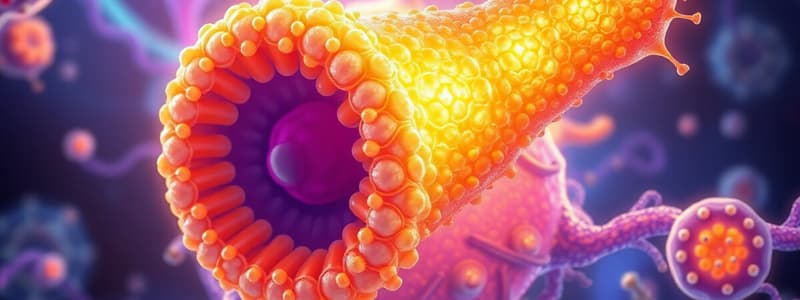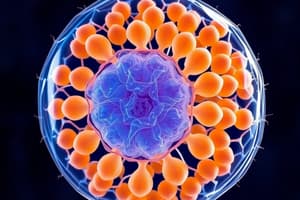Podcast
Questions and Answers
What is the primary function of chloroplasts in plant cells?
What is the primary function of chloroplasts in plant cells?
- Synthesize ATP
- Produce hydrogen peroxide
- Store nutrients
- Facilitate photosynthesis (correct)
Which structure provides a larger surface area for ATP synthesis within mitochondria?
Which structure provides a larger surface area for ATP synthesis within mitochondria?
- Mitochondrial matrix
- Cristae (correct)
- Thylakoids
- Intermembrane space
What type of molecules do peroxisomes primarily target for breakdown?
What type of molecules do peroxisomes primarily target for breakdown?
- Lipids (correct)
- Carbohydrates
- Proteins
- Nucleic acids
Which component of chloroplasts is responsible for capturing light energy?
Which component of chloroplasts is responsible for capturing light energy?
What is the main role of the mitochondrial matrix?
What is the main role of the mitochondrial matrix?
What is a primary function of the Smooth ER?
What is a primary function of the Smooth ER?
Which organelle is primarily responsible for modifying products of the Rough ER?
Which organelle is primarily responsible for modifying products of the Rough ER?
What process allows a cell to engulf another cell and form a food vacuole?
What process allows a cell to engulf another cell and form a food vacuole?
How do lysosomes help maintain cellular health?
How do lysosomes help maintain cellular health?
What type of vacuole is found in many freshwater protists and serves to pump water out of the cell?
What type of vacuole is found in many freshwater protists and serves to pump water out of the cell?
Which of the following is NOT a function of vacuoles in eukaryotic cells?
Which of the following is NOT a function of vacuoles in eukaryotic cells?
What components do lysosomes use to perform their digestive functions?
What components do lysosomes use to perform their digestive functions?
Which part of the Golgi Apparatus is involved in sorting and packaging materials into vesicles?
Which part of the Golgi Apparatus is involved in sorting and packaging materials into vesicles?
What is the main purpose of storage roots?
What is the main purpose of storage roots?
What distinguishes corms from bulbs?
What distinguishes corms from bulbs?
Which modified stem is primarily adapted for photosynthesis?
Which modified stem is primarily adapted for photosynthesis?
What is the primary function of ground tissues in plants?
What is the primary function of ground tissues in plants?
How do stolons contribute to plant reproduction?
How do stolons contribute to plant reproduction?
What defines an axillary bud?
What defines an axillary bud?
Which type of sclerenchyma is characterized by long, slender cells?
Which type of sclerenchyma is characterized by long, slender cells?
What is the primary role of the dermal tissue system in plants?
What is the primary role of the dermal tissue system in plants?
What function do thorns serve for a plant?
What function do thorns serve for a plant?
What is a characteristic feature of tubers?
What is a characteristic feature of tubers?
Which of the following tissues is NOT a part of the dermal tissue system?
Which of the following tissues is NOT a part of the dermal tissue system?
What are the waxy cuticles secreted by epidermal cells responsible for?
What are the waxy cuticles secreted by epidermal cells responsible for?
What do the internodes of a stem represent?
What do the internodes of a stem represent?
Which type of sclerenchyma cell is short, irregularly shaped, and has a thick secondary wall?
Which type of sclerenchyma cell is short, irregularly shaped, and has a thick secondary wall?
What type of dermal tissue is found in older stems and roots?
What type of dermal tissue is found in older stems and roots?
Which of the following is a characteristic feature of collenchyma tissue?
Which of the following is a characteristic feature of collenchyma tissue?
What distinguishes dense fibrous connective tissue from loose fibrous connective tissue?
What distinguishes dense fibrous connective tissue from loose fibrous connective tissue?
Which type of connective tissue is primarily found in tendons and ligaments?
Which type of connective tissue is primarily found in tendons and ligaments?
What role does fibroblasts play in fibrous connective tissue?
What role does fibroblasts play in fibrous connective tissue?
What is a common function of loose fibrous connective tissue?
What is a common function of loose fibrous connective tissue?
Which characteristic is NOT true about cartilage?
Which characteristic is NOT true about cartilage?
What is the primary component of the extracellular matrix in bone tissue?
What is the primary component of the extracellular matrix in bone tissue?
What type of connective tissue contains adipose cells that store fat?
What type of connective tissue contains adipose cells that store fat?
What are the small chambers where cartilage cells reside called?
What are the small chambers where cartilage cells reside called?
Flashcards are hidden until you start studying
Study Notes
Golgi Apparatus and Endoplasmic Reticulum
- Smooth ER lacks ribosomes, serving primarily for lipid synthesis.
- Rough ER is studded with ribosomes and modifies products from the smooth ER.
- Golgi apparatus sorts and packages materials into transport vesicles and manufactures specific macromolecules like polysaccharides and nucleic acids.
Lysosomes and Vacuoles
- Lysosomes fuse with food vacuoles to digest molecules, and recycle organelles through autophagy.
- Eukaryotic cells may contain multiple vacuoles, including:
- Food vacuoles formed by phagocytosis.
- Contractile vacuoles in freshwater protists to expel excess water.
- Central vacuoles in mature plant cells store organic compounds and water.
Mitochondria and Chloroplasts
- Mitochondria possess an inner membrane creating intermembrane spaces and a matrix where some metabolic cellular respiration processes occur.
- Cristae increase the surface area for ATP synthesis.
- Chloroplasts, found in plants and algae, are the sites of photosynthesis and contain chlorophyll.
- Chloroplast structure includes thylakoids (stacked to form granum) and stroma (internal fluid).
Peroxisomes
- Specialized compartments surrounded by a single membrane, producing and breaking down hydrogen peroxide.
- They utilize oxygen to degrade various molecules.
Plant Stem Types
- Stems consist of nodes and internodes.
- Axillary buds may form lateral shoots, while apical buds are terminal buds at the tip.
- Modified stems include:
- Corms: Short, thickened, nutrient-storing underground stems.
- Bulbs: Nutrient-rich, short-stemmed underground storage organs.
- Tubers: Fleshy underground stems for starch storage.
- Stolons: Horizontal stems that produce new plants at nodes.
- Cladodes: Flattened, leaf-like stems that photosynthesize.
- Thorns: Pointed modified stems for plant protection.
Sclerenchyma and Dermal Tissues
- Sclerenchyma includes fibers (long, slender cells) and sclereids (short, irregular cells).
- Dermal tissues cover the plant's external parts, composed of epidermal cells that secrete a protective waxy cuticle.
Ground and Vascular Tissues
- Ground tissues engage in photosynthesis, food storage, and support, including parenchyma, collenchyma, and sclerenchyma cells.
- Vascular tissues consist of xylem, responsible for water and nutrient transport.
Connective Tissues
- Fibrous connective tissue is primarily made of collagen fibers and fibroblasts, existing as loose and dense forms.
- Loose fibrous connective tissue supports organs and includes adipose tissue for fat storage.
- Dense fibrous connective tissue is robust, supporting ligaments and tendons.
Supportive Connective Tissues
- Cartilage is a flexible tissue that protects joints and supports structure, with cells housed in lacunae.
- Bone provides structure, strength, and protection for soft tissues, characterized by a solid extracellular matrix.
Studying That Suits You
Use AI to generate personalized quizzes and flashcards to suit your learning preferences.




